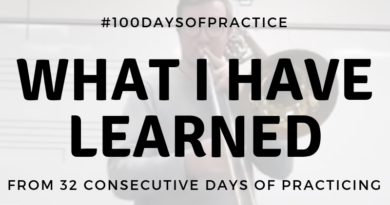Saying ‘Yes’ then ‘No’ to a Gig
A couple weeks ago, the well-known blogger and entrepreneur Seth Godin wrote a post on saying “No.” In the post, Godin gave examples and scenarios based on a person’s true desires and if a situation is truly worth your time and effort. (Side note – if you have not subscribed to his daily blog posts, you need to! – click here).
After reading this, I started to think about the times I had to say ‘No’ to gigs. Last year, it happened quite a bit. Usually my response was due to a conflicting gig or it wasn’t worth my time and effort. In some ways, it is a good place to be. First off, people were wanting me. Whether I was the first or last choice, doesn’t matter – people wanted me and the phone was ringing! Second, it meant that I had other work that is of higher priority and/or pays better. I was in a place that was consistently paying the bills. Whew!
But, what about those one-time gigs that call that are BETTER than a current situation. Here could be a few scenarios that you might have experienced early on in your freelancing career:
- A community band (non-paying) has a gig the same day a local orchestra needs a trumpet player later that night.
- A college ensemble (non-paying) has a concert the same night a jazz orchestra downtown (paying) needs a bass trombone player.
- A church (paying) needs a tuba player in their morning service even though I agreed to sub on bass guitar in my church’s worship band (non-paying).
I have faced situations similar to these and I have to say it is tough. I don’t get these on a regular basis and I don’t advocate doing this frequently as it can possibly hurt your dependability. But things and opportunities come up without knowing. In any situation, two things have to be constant – communication and professional courtesy. What I mean is even if you are playing in a community band that doesn’t pay, you should give the same courtesy to them as if your situation was with a full-time orchestral conflict. Professionalism is notifying personnel staff ASAP of the situation and finding a substitute of equal or better quality than yourself – someone who is capable of walking into a rehearsal or concert with little preparation if necessary. For college students, notify the orchestra manager and your lessons instructor, let them know who your sub will be if you get “the call.” Having the experience of being an orchestra manager in graduate school, nothing frustrated me more than when a student did not find a sub for a rehearsal/concert just because a paid gig came up. Yes, the phrase, “Ask Forgiveness Later” is okay, but not in this case. Why? Your classmates will become your colleagues and they will remember your dependability when you are in the real world.
Here are Three Scenarios that I had last year where “Yes” then “No” occurred, and here was my thought process for each situation.
- July of 2015, I had said “Yes” to play with a non-paying, professional-quality gig for their upcoming season. This gig had given me many paying gigs, and I had played with them for 3-4 years (plus I enjoyed the gig). The personnel manager knew my situation as a freelance musician, and at times other trombonists were used if I was unavailable. In October of the same year, I was hired to join the staff at a local church that would require my time and effort away from this ensemble. I kindly sent an email (a month after a concert and six months before my next assigned concert) to the personnel manager giving him the situation and pulling my availability (saying “No”) for the season. I did my best to leave the door open for future availability if he was in a last minute pinch. I ended the email by thanking him for the opportunity and showing appreciation for allowing me to play.
- In the Summer of 2015, I had said “Yes” to play with a paying orchestra for their upcoming 2015-2016 season. It was a new ensemble for me, but I had already worked with many of the musicians, including the personnel manager. In October (3 months before my assigned concerts), the same situation of being hired to join the ministry staff occurred, and I quickly sent an email to the NEW personnel manager of this orchestra, explained the situation, and also gave her a name of someone to contact to take my place. I thanked her for considering me and kept the door open if needed.
- In January 2015, I had said “Yes” to a student at one of of the local colleges who asked me to volunteer to play one of her quintet compositions for her senior recital that would be held in April 2015. This wasn’t a premiere of the piece and another student had played the piece before. Two weeks before the April performance, I had been contacted by a friend to sub for him at a local orchestra – an orchestra I had not played with yet and was wanting to get on their contact list. While I knew this could be a sticky situation, I quickly contacted the composition student, her professor, and department chair to explain the situation, and offered a solution of getting the previous performer to take my place. Everyone was gracious, understood my situation and the previous student was able to perform in the quintet.
Saying ‘Yes’ then ‘No’ can have negative effects, and is certainly different in each situation. My thoughts in general would be:
- Communicate to each party as quickly as possible.
- Ask yourself, “How much will the ‘No’ gig be affected?”
- Have a substitute(s) ready for the ‘No’ gig (and contact that sub before contacting personnel).
- How important is the ‘Yes’ (and ‘No’) gig in the future?
- Keep the door open for the ‘No’ gig by helping them another time.
- Remember – your decision could ultimately affect your future dependability.
Right out of grad school, when I was first breaking into the freelance scene, I said ‘yes’ to everything right away (paid and non-paid). As I have gotten more settled into regular gigs (paid and non-paid), I have been better at saying ‘Yes’ and ‘No’ to certain gigs simply because I look at the pros and cons before responding. (It also helps to have a wife that helps me think rationally…)
What are your thoughts, opinions, and criticisms? Do you have any other tips or personal scenarios you would like to share?
Comment below or email me at [email protected].


